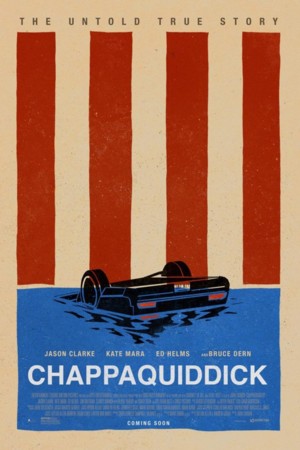'Teddy, Teddy, I'm pregnant!
Never mind Mary Jo. We'll cross that bridge when we come to it.'
So went the joke created by my friend Brian in 1969 - at least he was certainly the originator among our circle of friends.
The joke was amusingly current throughout 1970's as Teddy Kennedy again stood for the Senate and made later headlines. It got a another good run a decade later when Teddy decided to run against the incumbent President Jimmy Carter for the Democratic Presidential nomination.
In March 1979 I was living in New York when the Nuclear Reactor at Three Mile Island went critical and the core began to melt down.
Serendipitously twelve days earlier the movie The China Syndrome had premiered, based on the idea that the molten core of a reactor would bore straight down through the containment and keep going - through the Earth's mantle - all the way to China. A super volcano would erupt killing everyone.
|
|
| No responsibility is accepted for linked third party video or media content - see Terms of Use and Copyright. You follow any YouTube links or advertisements displayed at your own risk. |
Actress Jane Fonda had stared as an investigative reporter in the movie and now reprised her role in real life. Anti-nuclear rallies were organised. Teddy saw a chance to jump on the bandwagon.
As it turned out the Reactor's containment proved to be effective and although the clean-up cost an estimated one billion, no one was injured or suffered long-term harm. So in 1980 bumper stickers appeared across the City and presumably across the Nation:
More people died at Chappaquiddick than died at Three Mile Island |
Teddy's past had caught up with him. But in the process he had destroyed Jimmy Carter's chances of a second term and put the actor Ronald Regan into the White House.
Now there's a new movie: Chappaquiddick - The untold true story.
|
|
| No responsibility is accepted for linked third party video or media content - see Terms of Use and Copyright. You follow any YouTube links or advertisements displayed at your own risk. |
We saw it on Sunday - the day after the royal nuptials at Windsor.
If you are interested in the Kennedys or the exercise of establishment power in the US go and see it, otherwise don't bother.
The movie is as interesting for what it doesn't say as for what it does. The influence of Joseph Kennedy on his son and children in general is not explained. He's represented as horrible: his only substantial advice being: 'get an alibi'.
We are left to guess that a possible explanation of Teddy's reluctance to report the 'accident' was fear of his father who's dubious business practices, shady connections and overweening ambitions for his four sons are notorious. The initial legal suppression of Mary Jo's inquest results and the lack of an autopsy - are covered in a reference to getting control of the body because 'a dead body holds a lot of secrets'. The initial observation at the scene found no physical trauma sufficient to cause death, like a broken neck, yet little water in her lungs or other organs, suggesting that she suffocated rather than drowned.
And was Mary Jo Kopechne a hand-me-down from Bobby? As it is alleged Marilyn was from Jack to Bobby. An affair is hinted at but effectively disregarded despite dramatising the very prompt cover-up of the true nature of the beach-party that night and confusion over where they were going. To the last ferry on the wrong road.
The movie brushes over the big time discrepancy of an hour and a half from when Teddy and Mary Jo left the party until his car was seen stationary in an isolated road and reported by a local cop. During later investigative interviews with participants in the recovery of the car and of the body witnesses made various claims suggesting adultery, including that Mary Jo was not wearing panties and had what looked like grass stains on the collar of her blouse.
In his televised statement Teddy alludes to such speculations and denies them absolutely, shades of Bill Clinton.
They are both dead so will we ever know? So the movie accepts Teddy's claim and Mary Jo is squeaky clean, the only innocent in the story.
But the most telling thing is the reconstruction of the incident. Somehow (it's repeated several times) Teddy got out of a sealed car that trapped Mary Jo, despite repeated attempts to get her out. This is left to the audience to notice and to ponder. Perhaps, as speculated by several investigators at the time, he was not in the car when it went over the edge? Maybe they'd separated somewhere near the bridge (else how did he know she'd crashed) leaving him to walk back, then she sped off in his unfamiliar car, eager to catch the last ferry?
The movie gives us repeated scenes, perhaps in his imagination, of her slowly running out of oxygen. Was he waiting until she was certainly dead?
It's more or less accepted that all the Kennedy boys, like their father before them, had girlfriends outside of marriage. But the film's exploration of Teddy's, perhaps much more serious, moral weakness, or was it duplicity, is at its core. The message is clear: that night in 1969 the World dodged a bullet when this flawed man's Presidential aspirations failed to make it across that bridge at Chappaquiddick.
For more about Jimmy Carter and the 1980 presidential campaign see my notes on his Presidential Library and museum in Atlanta. Read More...

